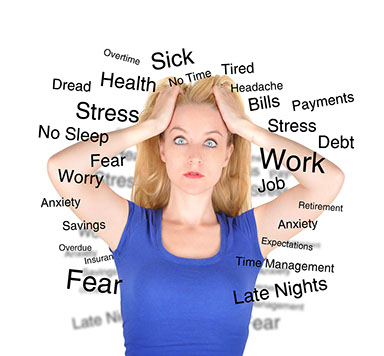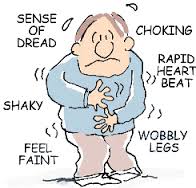Hypnosis Hypnotherapy Whitby Scarborough Filey Bridlington Pickering Malton Market Weighton Driffield York Guisborough Redcar Saltburn Middlesbrough Thirsk North Yorkshire UK

Treatments
Letting go of Stress and Anxiety
Do you ever feel stressed or anxious, sometimes for no obvious reason?
Do social situations and meeting new people bother you?
Are feelings of panic stopping you from leading a full social life?
If you had to talk to a group of people would that cause you to worry excessively?
At times we can all experience periods of stress and anxiety in our lives…
But too much stress causes the subconscious mind to over-react with primitive levels of fear and panic. These lower our self-confidence, cause irritability and can sometimes lead to depression. High blood pressure, insomnia and stomach upsets can also occur.
When someone is anxious they can lose weight because they eat less, or alternatively put weight on through comfort and binge eating. Indigestion and nausea are commonplace. Other symptoms of anxiety include urinary problems, such as passing water more frequently, and pain in the bladder.
Some people can experience irregular heart beats, palpitations and constrictions in their chest. In the absence of an organic cause, these are all stress and anxiety related issues. Panic attacks can also be quite common.
Blushing and self-consciousness can be a problem in company, whether at work or socially where feelings of insecurity can arise. Shyness often restricts interaction with others. And feelings of inferiority can undermine confidence. Phobias can develop too, particularly social phobia.
Headaches are a common sign for some people. Abdominal pain can also occur, sometimes diagnosed as Irritable Bowel Syndrome (IBS). Constipation or diarrhea are not uncommon. General pain in the neck and shoulders are often the result of bottled-up stress and anxiety. Sometimes buzzing and ringing in the ears can occur and giddiness may be a problem. Vision can be affected. Insomnia is a very common reaction to anxiety.
Some people are very sensitive to worries, stress and anxiety. Broadly speaking a person's vulnerability to anxiety-related problems can be associated with: personality type, family history, life stresses, psychological style, coping skills and social support.
It is too easy to develop problem fears, phobias and anxieties. Such that nearly all of us at one time or another will experience.
The most commonly used descriptions are: phobias; panic attacks; generalized anxiety disorder (GAD); obsessive compulsive disorder (OCD); physical problems and hypochondriasis; executive stress or burn-out; and post-traumatic stress disorder (PTSD). Stress plays a key part in all of these.
But these are just a few of many psychosomatic (mind/body) effects that anxiety and stress can have on our health and well-being.
Many people visit their doctor with alarming symptoms, believing that they have serious underlying causes. They are often quite surprised and disbelieving when they're told they are suffering from anxiety and stress.
Our Emotions
Our emotions have evolved for good survival reasons: to protect us from danger, for personal bonding, to motivate action and develop ideas. Negative emotions put a brake on our thoughts and actions. Those that are positive strengthen our resolve to achieve, for example a fear of poverty can be motivating. It helps if we understand our feelings, not hide from them.
Depression, anxiety, and panic attacks respond well to the self-awareness achieved by hypnotherapy.
With emotional problems it is the cause which should be addressed. A particular symptom, such as a phobia, may have a very different cause in each individual. - unlike a bacterial infection where the cause is the same for everyone. With emotional causes there can be less commonality between symptoms and cause.
Stress & Anxiety in Your Life
Both anxiety and depression can be subconscious habits. The subconscious mind seeks out 'evidence' for feeling anxious or depressed which can become self-perpetuating. We see what we want to see, hear what we want to hear, feel what we want to feel. Certain patterns are established.
Some problems may be little more than imaginary fears of what could happen. The subconscious is worrying about past, present or future events. This can stem from a desire for certainty when life itself is uncertain. There are inner insecurities. Some people may believe that worrying can influence future events, even when logically we know it can't. Taking action produces results.
Stress is usually caused by excesses and change from the norm – pressures to perform, uncertainty, recession, increased job load, maintaining quality, excessive hours, frustration, targets to be met, marital problems, bereavement, redundancy, to name a few.
Negative 'mental chatter' can lead to 'rumination' or worry – going over things time and time again, just to see if we've missed something.
These are just a few of the many psychosomatic effects that anxiety and stress can have on our health and well-being.
Hypnotherapy and techniques of stress release can help to restore harmony and strengthen our ability to cope with the stresses of life. Any underlying subconscious influences can be explored in hypnosis.
How we react
Unfortunately, many people turn to cigarettes, alcohol, food or tranquillizers as a way of coping with stress. Short-term these may help, but longer-term they can just make matters worse.
Sources of Stress & Anxiety
Most people would list at least half a dozen major sources of stress in their lives - from financial worries to sleepless nights with the baby. But there are two basic sources:
External
Those events “outside of ourselves” that create stress within us. Could be a new job, work pressures, or financial concerns… – some of these are within our control, others are outside. How we react to these determines how stressed we feel.
Internal
To a certain extent, how we deal with the external stresses is determined by our programmed attitudes and beliefs.
We’ve had different parents, various childhood experiences, physical and emotional events.
We can therefore react to the same situation very differently.
Physical symptoms of stress & anxiety include
• headaches
• feeling faint
• chest pains
• breathlessness
• sweating
• nervous twitch
• cramp or muscle spasms
• high blood pressure
• feeling dizzy or sick
• tiredness
• restlessness
• poor sleeping
• constipation or diarrhea
• overeating
• indigestion or heartburn
• lack of appetite
• sexual difficulties
Common feelings
• irritability
• loss of interest in others & things
• aggressive
• feeling ‘low’
• feel unloved & neglected
• feel unattractive
• lonely
• imagined fears & illness
• fear of failure
• losing your sense of humour
• expecting the worse
• dreading the future
• pessimistic in outlook
What can happen when stressed, anxious or depressed
• can’t make decisions
• procrastinate
• tearful
• difficulty concentrating
• pulling hair
• biting nails
• ‘burying’ problems
• hiding true feelings
Generalized Anxiety Disorder (GAD)
Worrying tries to address the uncertainties of life by replaying many times a particular theme in our thoughts. It is a persistent and pervasive feeling of anxiety where the person can never relax and is never free from worry. Such chronic worrying is both physically and emotionally draining. Many situations are perceived as threatening.
Associated with worry are:
• Muscular tension
• Restlessness
• Easily fatigued
• Irritability
• Sleep disturbances
• Difficult in concentrating
What do people worry about?
People worry about all sorts of things, including:
• Responsibility for others
• Relationships
• Finance
• Making decisions
• Changing jobs
• Getting promotion
• Their ability to cope
• Future uncertainties
• Sexual issues
• Being a good parent
• Threats to family & friends
• Their health
Emetophobia
 One other anxiety condition which Alan has had regular client experience with is Emetophobia. This is an intense anxiety of vomiting. Individuals can have a fear of vomiting in public, just a fear of feeling sickly, or a fear of seeing someone else vomit. Or indeed anything associated with vomiting, including places. To self-manage this condition it is common for individuals to significantly restrict their eating and drinking. And being underweight, even anorexic, is a common effect.
One other anxiety condition which Alan has had regular client experience with is Emetophobia. This is an intense anxiety of vomiting. Individuals can have a fear of vomiting in public, just a fear of feeling sickly, or a fear of seeing someone else vomit. Or indeed anything associated with vomiting, including places. To self-manage this condition it is common for individuals to significantly restrict their eating and drinking. And being underweight, even anorexic, is a common effect.
Fear of being sick is a surprisingly common problem with an estimate of near 10% of women and 3% of men suffering from the condition. It isn't talked about as much as other phobias due to a fear of feeling silly and not being understood. Sufferers can therefore feel isolated
Emetophobics can also suffer from other anxiety issues such as: fear of flying, social phobia and agoraphobia. The lifestyles of suffers can therefore be severely restricted, such as avoiding alcohol, joining social occasions and travelling on public transport. Individuals tend to be natural worriers. They can have a fertile, but rather negative, imagination.
This anxiety condition can have a number of causes, but childhood experiences and a fear of losing control can often be a central aspect. As with all automatically initiated fears and phobias, early subconscious programming and learned behaviours need to change to allow irrational fears to let go and relax. Our imagination plays a major part in all fears and phobias. Just as individuals who have a more limited imagination tend to suffer far less from fears or phobias generally Those with a vivid yet over-cautious imagination can convince themselves that the worst will happen.
Unlearning the tendency to imagine the worse outcome can be achieved in hypnosis as part of the process of change. Where relevant too, any life experiences in the formative years which programmed in habitual reactions can be addressed. Hypnosis can often facilitate the recall of earlier memories which over time have slipped out of conscious memory.
Real or imaginary?
In practical terms problems and worries, can be grouped as:
• Could be solved
• Can’t be solved
• Imagined and probably will never happen
• Worrying about worry itself
Anxiety and worrying is an overprotective imagination
It is often best to:
• Break problems down into smaller elements
• See the problem as a challenge, not a threat
• Don’t get too far ahead of yourself (often worriers seek perfection)
• Don’t worry about making a less than ideal solution
• Build confidence in your own judgment, taking small steps at a time.
• Accept that some things (and people) can’t or won't change
• Seek longer term solutions, where appropriate.
Many physical health problems are due to the body being in a ‘permanent anxiety state of alert’ which arises from stress.
In the case of hypochondriasis this too is a stress-related condition where there is distress in response to perceived symptoms. This is often associated with extra sensitivity to normal bodily sensations and/or a preoccupation with the fear of catching a serious disease or illness. Checking for signs of illness can become obsessional, but reassurance by others can prevent the person from learning to reassure him/herself and to overcome the health fears.
Panic Attacks
Panic attacks can potentially happen to anyone. Remember, feeling anxious at times is perfectly normal. Indeed, some anxiety can enhance our mental and physical performance. However, in panic attacks the body is physically over-reacting in an uncontrollable way to actual or perceived fears. More often this is an over-reactive emotional release to past or present worries about relationships, work, health issues, finances or indeed anything which may be real or imagined.
A fear can be programmed or remembered by the subconscious mind and triggered/reminded by a present day event or thought. Adrenalin is then released, both when we feel anxious and during a panic attack, to prepare our mind and body for activity. This speeds everything up: heart beat, breathing and other bodily functions, including our mental reactions. Nonetheless being an over-response to fear, during a panic attack our mobility can be restricted as even more adrenalin than normal is produced.
Being too sensitive to fears can establish a habitual way of subconsciously (automatically) over-reacting. This can lead us to over-think and analyze our fears in the believe that this will somehow keep us safe.
But consciously analyzing the panic attack rarely works. Instead, over-thinking can increase anxiety. Learning to let go is much better. It is the subconscious, or 'auto-pilot' response, which needs to be reprogrammed. Which is where hypnotherapy comes into focus.
Of course, many people with stress, worry and anxiety also suffer from insomnia. The symptoms of Irritable Bowel Syndrome (IBS) too are closely associated with the effects of stress and anxiety. Tinnitus can be made worse by stress. Nail and skin biting can be a means of distracting and venting internal anxieties.
The good news is that stress, anxiety, and panic attacks can be effectively treated with hypnotherapy.
Techniques of stress management can also allow you to take control of your life.
Body Dysmorphic Disorder (BDD)
This too is a relatively common anxiety disorder in which a person has a distorted view of their appearance. Consequently they spend a large amount of time being worrying about their appearance.
For example they might be self-conscious of having too large a nose, worry about their complexion, that they are too short, or some other aspect of their appearance that is not to their liking. Perception plays a big part. This could equally apply to many people, but most are not over-self conscious about their apparent imperfections. The condition is estimated to affect one person in 100 in the UK, but this could be an underestimate. It may not be readily discussed with others.
For someone with BDD they fail to be convinced, or reassured, that how they look is what makes them unique as an individual. This might feel they are ugly or defective in some way. Clearly this can be very upsetting, depressing and undermine a person's self-confidence. It can easily have a negative impact socially and professionally.
The condition can effect all age groups, but often starts during the sensitive teenager years. Males and females are equally affected.
People with a history of depression and social phobia are also prone to BDD. It can also occur in association with Obsessive Compulsive Disorder (OCD) and Generalized Anxiety Disorder (GAD). Eating disorders, such as anorexia and bulimia may occur too.
Typical behaviours
People with BDD may:
• keep comparing their looks with others
• spend a long time looking in the mirror, yet not other times
• feel anxious around people and avoid social situations
• try to conceal their perceived physical defects
• feel distressed about a particular part of their body, often their face
• have surgical interventions
• still feel unhappy about themselves
• diet and exercise excessively
• seek reassurance from others
• groom excessively
There are some similarities with OCD.
Body Dysmorphic Disorder can arise from bullying, abuse and generally negative feedback from peers, parents, teachers and others in position of influence. There could possibly be a genetic predisposition.
Hypnotherapy can address the negative early life conditioning and help build a stronger self-belief.





Across Scarborough Whitby Filey Hunmanby Seamer Bridlington Pickering Malton York Middlesborough Stockton Redcar Saltburn Guisborough Market Weighton Driffield Thirsk Kirkbymoorside Helmsley Kingston upon Hull Teesside East Yorkshire North Yorkshire and the North of England
Making an Appointment
We provide a Free and informal Initial Appointment (30 minutes) if requested to discuss your personal needs and establish if we can help. Please feel free to bring a friend along for company if you wish.
Please note:
If you telephone and we are with a client, you may be directed to leave a message. Please give your name and telephone number and a suitable time to call you back. Due to the confidential nature of our work, Alan personally takes all appointment bookings.
Hypnosis Whitby Hypnotist Filey Hypnotherapy Bridlington Hypnosis Pickering Hypnotist Malton Hypnotherapist Driffield Hypnosis North Yorkshire
Personal Development for Health & Success
Natural Relaxing Liberating
Scarborough Hypnotherapy –
the specialist in helping you
Become the Person You Want To Be.
Scarborough Hypnotherapy has no control of and accepts no responsiblity for the content and products of websites external to the Scarborough Hypnotherapy website.
© Copyright Alan Gray Scarborough Hypnotherapy Practice 2006-17. All rights reserved.